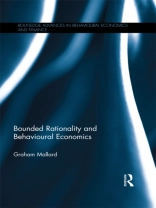Economics Nobel Laureate Herbert Simon developed the concept of bounded rationality in the 1950s. This asserts that the cognitive abilities of human decision-makers are not always sufficient to find optimal solutions to complex real-life problems, leading decision-makers to find satisfactory, sub-optimal outcomes. This was a foundational component of the development of Behavioural Economics but in recent years the two fields have diverged, each with its own literature, its own approach and its own proponents. Behavioural Economics explores the areas of commonality between Economics and Psychology, in terms of its focus and its approach, whereas the bounded rationality literature largely analyses the implications of sub-optimal decision-making through the mathematically sophisticated methodology of mainstream Economics. This book examines the nature and consequences of this divergence and questions whether this is a case of beneficial specialisation or whether it is unhelpful, potentially stunting the development of some aspects of Economics. It has been suggested that the major deficiency of Behavioural Economics is that it has failed to produce a single, widely applicable alternative to constrained optimisation. This book evaluates the extent to which this is the true and, if it is, the extent to which it is a product of the divergence between the two literatures. It also seeks to identify commonalities between the two subjects and suggests avenues of research in Economics that would benefit from a re-fusion of these two fields.
Graham Mallard
Bounded Rationality and Behavioural Economics [PDF ebook]
Bounded Rationality and Behavioural Economics [PDF ebook]
Compre este e-book e ganhe mais 1 GRÁTIS!
Língua Inglês ● Formato PDF ● Páginas 140 ● ISBN 9781317653851 ● Editora Taylor and Francis ● Publicado 2015 ● Carregável 3 vezes ● Moeda EUR ● ID 4474353 ● Proteção contra cópia Adobe DRM
Requer um leitor de ebook capaz de DRM












